
The Bank of England has increased the cost of borrowing by 0.75 percentage points – to 3%, despite predicting that higher interest rates would push the economy into the longest recession since the 1930s.
In a split vote, the central bank’s monetary policy committee (MPC) voted by a 7-2 majority for the biggest increase in rates since 1989 to combat an inflation rate that hit 10.1% in September.
The Bank blamed higher energy prices and a tight labour market for the decision to increase interest rates, matching rises in the last week by the US Federal Reserve and the European Central Bank.
The last time rates increased by more than 0.5% was in 1989. John Major’s government was forced into a 2% hike during the exchange rate mechanism crisis in 1992, though for less than 24 hours before it was scrapped.
Without taking into account the chancellor’s likely squeeze on government spending in his budget on 17 November, which could worsen the outlook for economic growth, the MPC said the economy was already contracting and would continue to shrink for eight consecutive quarters to the summer of 2024 if interest rates continued to rise as financial markets expected.
The Bank expects inflation, which hit 10.1% in September, to peak at 11% by the end of 2022, and then to fall “probably quite sharply” from the middle of 2023.
The severity and length of the recession is expected to crush consumer spending and hit business confidence, leading to a two-year recession that will be longer, if not deeper, than the slump in the 1930s.
Conservative MPs are likely to be concerned at the forecast, which shows the economy only just reviving before a general election expected in the second half of 2024 and the economy growing only modestly in 2025.
Inflation has taken off in most developed countries as the war in Ukraine reduced the supply of gas and sent world prices of essential resources soaring.
Britain has been hard hit by a combination of high energy prices and a lack of workers in several key industries, leading to concerns of spiralling wages.
The Bank of England has ramped up its rate rises in recent months as the impact on gas and other commodity prices from the war intensified.
After turmoil in financial markets that followed Liz Truss’s mini budget, investors forecast interest rates peaking at 5.25%, but before the November MPC meeting they had already reduced the expected peak to 4.75%.
The gloomy forecasts are expected to be interpreted by financial markets that interest rate rises will be limited in the next year, possibly to no more than 4%.
Critics of the central bank are expected to argue that further interest rate rises are unnecessary when the MPC’s central forecasts show inflation falling below its 2% target in 2024 should interest rates remain at 3%.
The Bank’s report said: “The economy has been subject to a succession of very large shocks. Monetary policy will ensure that, as the adjustment to these shocks continues, consumer prices index inflation will return to the 2% target sustainably in the medium term.”
However, it added that there were many moving parts to the economic outlook, domestic and from the global economy, to make forecasting economic growth next year difficult.
“There are considerable uncertainties around the outlook. The committee continues to judge that, if the outlook suggests more persistent inflationary pressures, it will respond forcefully, as necessary.”
Homebuyers with tracker or variable rate mortgages will feel the pain of the rate rise immediately, while the estimated 300,000 people who must remortgage this month will find that two-year and five-year fixed rates remain at levels not seen since the 2008 financial crisis.
Ahead of the MPC meeting, the average two-year fixed rate had fallen to 6.47% from 6.65% in mid-October – as the effects of the disastrous Kwasi Kwarteng mini-budget ease – but remains three times the rate offered by lenders earlier this year. A five-year fixed rate mortgage that could be bought for 6.51% on 20 October has slipped only marginally to 6.31%.
Mortgage payers that need to refinance will be hit by a £3,000 a year increase in interest payments, the Bank estimated, while private rents were also expect to increase sharply after the MPC decision.
The nine-strong MPC voted by seven to two for an increase of 0.75 percentage points, with two former LSE economics professors on the committee voting for a smaller rise. Silvana Tenreyro voted for a 0.25 percentage point rise while Swati Dhingra supported a 0.5 percentage point increase.
Read More: World News | Entertainment News | Celeb News
Guardian








